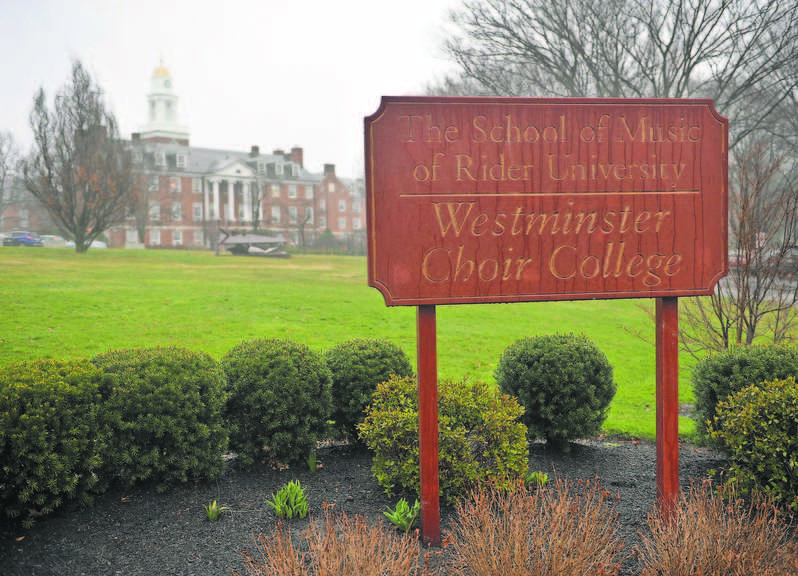A motion to dismiss Westminster Choir College students’ lawsuit to block Rider University’s plans to move the school from its Princeton campus to the university’s Lawrence Township campus is set to be heard on Jan. 10 in Mercer County Superior Court.
The pending motion filed by Rider University, will be heard by Mercer County Superior Court Judge Paul Innes at the Mercer County Courthouse in Trenton. The motion is in response to the students’ lawsuit, which was filed on Oct. 29, in Mercer County Superior Court.
Attorney Bruce Afran, who represents the 71 Westminster Choir College students, said the lawsuit was their idea. They recognize that moving to the Lawrence Township campus would destroy the choir college, so they sued, he said.
Opponents of the move claim that Rider University will be unable to match the facilities on the Princeton campus – from the 46 specialized practice rooms to spaces for the 20 pipe organs and 165 pianos.
However, Rider University officials are planning to renovate Gill Chapel to create 13 new practice rooms and to add six new practice rooms in the Kroner Hall dormitory. Combined with the existing 14 practice room at the Lawrence Township campus, 33 practice rooms will be available later this year.
The opponents also questioned how Rider University would be able to find room for the Westminster Choir College’s library, which consists of 67,000 books, music scores and periodicals; 5,400 choral music titles in performance quantities; the 80,000 choral reference collection; and the 23,000 sound and video recordings.
“Rider University now says that the 71 students who went to court in October 2019 to stop Rider’s move of their beloved conservatory have no right to use the courts to protect their school,” Afran said.
The university claims it is the only body that can make decisions regarding Westminster Choir College, he said.
“Nearly one-third of Westminster’s student body has gone to court to stop Rider’s move of the choir college, yet Rider claims they have no right to seek judicial relief to protect their education and this vaunted music school,” Afran said.
The students are beneficiaries of a 1935 trust that purchased the land for the choir college and that requires it to remain in Princeton. If the choir college abandons the campus, the trust requires the land to be turned over to the Princeton Theological Seminary, according to an advisory report to Judge Innes that was prepared by the New Jersey Office of the Attorney General.
The students’ lawsuit seeks to bar the sale of the 23-acre Princeton campus, either in part or in whole. But if a sale does occur, the lawsuit would prevent Rider University from pocketing the money for its own use. Rider would have to use the money “for the exclusive purposes or programs of Westminster,” the lawsuit said.
The lawsuit stems from Rider University’s announcement that it plans to move the Westminster Choir College to its Lawrence Township campus in September, 2020.
Rider University acquired Westminster Choir College through a merger in 1992. Three years ago, Rider decided to sell the choir college for financial reasons. It launched a worldwide search for a buyer, with the goal of finding one who would keep Westminster Choir College in Princeton.
Rider University found a buyer in a commercial, Chinese government-owned entity known as Beijing Kaiwen Education Technology Co., Ltd., but the deal fell through in July.
In the wake of the failed deal, Rider University announced plans to consolidate and move Westminster Choir College to its Lawrence Township campus, despite the lack of specialized facilities that the conservatory music students require.
The announcement triggered a flurry of lawsuits, beginning with one filed by Westminster Choir College and Rider University faculty members and Westminster Foundation members. The foundation is made up of alumni, faculty and supporters.
The lawsuit claims that under the 1991 agreement that led to the 1992 merger, Rider cannot move the choir college unless it can show that such a move or change is necessary to preserve the charitable purposes and mission of Westminster and that the move to the Lawrence campus will preserve such program and mission in the closest means possible to the existing mission, campus and operation of Westminster.
“Rider also has assumed such obligations under the 1935 Strong Taylor trust,” the lawsuit said.
The Strong Taylor trust was created by Sophia Strong Taylor, who gave 23 acres of land in Princeton when the Westminster Choir College relocated from Ithaca, N.Y., where it had been affiliated with Ithaca College.
As a condition of her gift, Taylor stipulated that the choir college must advance the “training of ministers of music of evangelical churches.”
Westminster Choir College was formed as the Westminster Choir of the Westminster Presbyterian Church in Dayton, Ohio, in 1920.
If Westminster Choir College ceased to do so, the land was to be given to the Princeton Theological Seminary, which is a private theological seminary that trains Presbyterian ministers.

